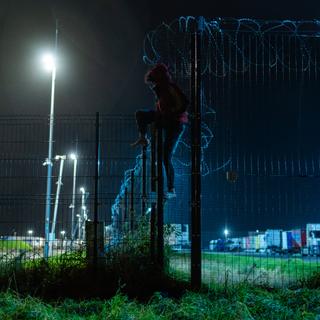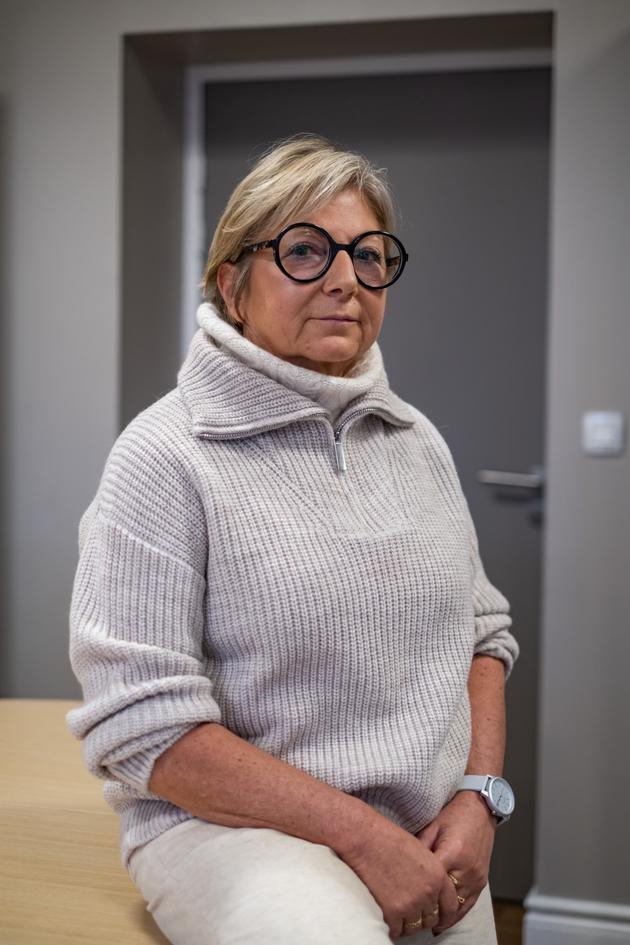


In Calais, the blind spots of the French government's immigration bill are laid bare
FeatureAs Interior Minister Gérald Darmanin travelled to the border city on Friday to defend his migration policy, humanitarian NGOs assisting migrants on the ground felt that the bill was far removed from their reality.
Mud and rain. This is what Mohamed Ismael, 28, and a handful of Sudanese compatriots found in the early hours of the morning, as they made their way out of their makeshift shack in Calais on France's northern coast. So, they formed a pile of pallet wood and, to get the fire going, they put in anything that would burn: Bags and a plastic jerry can. They sprayed the sparse embers with alcohol-based hand sanitizer, and sought a little warmth amid the toxic fumes. As night fell, they tried their luck in the gated parking lots nearby, where trucks bound for the UK were parked. In the cold, they waited for semi-trailers to appear, to which they could cling. Others climbed barefoot over fences and squeezed onto lorries' axles.

According to estimates, Ismael would be one of the 1,500 people – from Sudan, Afghanistan, Eritrea, etc. – currently living in Calais, in camps that are dismantled every 48 hours. French Interior Minister Gérald Darmanin was due to visit Calais on Friday, December 15. This was a symbolic visit to this border city, at a time when his immigration bill had been rejected by the Assemblée Nationale four days earlier, and was due to be examined by a joint committee on December 18. In Calais, Darmanin was scheduled to meet Mayor Natacha Bouchart (Les Républicains, LR, right-wing) and give awards to police officers and gendarmes "injured during missions to combat irregular immigration."
In particular, Bouchart aimed to ask the minister to reinstate the offense of illegal residence, which was abolished in 2012. "This would make it possible to remove people from the coast," said the local politician. She said she was also expecting the minister to announce the establishment of a new police station and the creation of humanitarian reception centers located throughout France and Europe, but "far from the borders."

The offense of illegal residence? "They're not going to arrest 1,500 people – it's not a measure that can be organized," said Amélie Moyart, from the migrant aid association Utopia 56. "Besides, these people come from countries at war to which we can't send them back." "As with election periods, Calais is a stage for theatrics, a pedestal for flirting with the Right and pushing through their bill," said Juliette Delaplace, who has been in charge of the Secours Catholique charity's "exiled persons" mission in Calais for over four years.
'Let's look at what already works before passing a law'
Many of those working with migrants in makeshift camps on northern France's Côte d’Opale have felt that Darmanin's bill does not address their problems. "The text says a lot about delinquent foreigners, but that doesn't apply to us," said Jeanne Bonnet, 25, who is involved in La Margelle, a "hospitality house" project that opened a year ago in Calais. The house can accommodate up to nine people – for a maximum stay of one and a half months – "who want to think about their project, establish themselves in France or apply for asylum, for example." Bonnet hails from Montaigu, a village in France's southwest that was host to people from Afghanistan when the "Great Jungle" of Calais was dismantled in 2016. They have since found work and are living in the nearby city of La Roche-sur-Yon. "Let's look at what already works before passing a law," she said.
You have 60% of this article left to read. The rest is for subscribers only.
